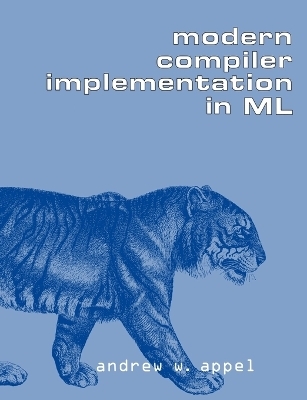
Modern Compiler Implementation in ML
Seiten
2004
Cambridge University Press (Verlag)
978-0-521-60764-3 (ISBN)
Cambridge University Press (Verlag)
978-0-521-60764-3 (ISBN)
Describes all phases of a modern compiler, including techniques in code generation and register allocation for imperative, functional and object-oriented languages.
This new, expanded textbook describes all phases of a modern compiler: lexical analysis, parsing, abstract syntax, semantic actions, intermediate representations, instruction selection via tree matching, dataflow analysis, graph-coloring register allocation, and runtime systems. It includes good coverage of current techniques in code generation and register allocation, as well as functional and object-oriented languages, that are missing from most books. In addition, more advanced chapters are now included so that it can be used as the basis for two-semester or graduate course. The most accepted and successful techniques are described in a concise way, rather than as an exhaustive catalog of every possible variant. Detailed descriptions of the interfaces between modules of a compiler are illustrated with actual C header files. The first part of the book, Fundamentals of Compilation, is suitable for a one-semester first course in compiler design. The second part, Advanced Topics, which includes the advanced chapters, covers the compilation of object-oriented and functional languages, garbage collection, loop optimizations, SSA form, loop scheduling, and optimization for cache-memory hierarchies.
This new, expanded textbook describes all phases of a modern compiler: lexical analysis, parsing, abstract syntax, semantic actions, intermediate representations, instruction selection via tree matching, dataflow analysis, graph-coloring register allocation, and runtime systems. It includes good coverage of current techniques in code generation and register allocation, as well as functional and object-oriented languages, that are missing from most books. In addition, more advanced chapters are now included so that it can be used as the basis for two-semester or graduate course. The most accepted and successful techniques are described in a concise way, rather than as an exhaustive catalog of every possible variant. Detailed descriptions of the interfaces between modules of a compiler are illustrated with actual C header files. The first part of the book, Fundamentals of Compilation, is suitable for a one-semester first course in compiler design. The second part, Advanced Topics, which includes the advanced chapters, covers the compilation of object-oriented and functional languages, garbage collection, loop optimizations, SSA form, loop scheduling, and optimization for cache-memory hierarchies.
Part I. Fundamentals of Compilation: 1. Introduction; 2. Lexical analysis; 3. Parsing; 4. Abstract syntax; 5. Semantic analysis; 6. Activation records; 7. Translation to intermediate code; 8. Basic blocks and traces; 9. Instruction selection; 10. Liveness analysis; 11. Register allocation; 12. Putting it all together; Part II. Advanced Topics: 13. Garbage collection; 14. Object-oriented languages; 15. Functional programming languages; 16. Polymorphic types; 17. Dataflow analysis; 18. Loop optimizations; 19. Static single-assignment form; 20. Pipelining and scheduling; 21. The memory hierarchy; Appendix.
| Erscheint lt. Verlag | 8.7.2004 |
|---|---|
| Zusatzinfo | Worked examples or Exercises; 34 Tables, unspecified; 80 Line drawings, unspecified |
| Verlagsort | Cambridge |
| Sprache | englisch |
| Maße | 190 x 245 mm |
| Gewicht | 989 g |
| Themenwelt | Informatik ► Theorie / Studium ► Compilerbau |
| ISBN-10 | 0-521-60764-7 / 0521607647 |
| ISBN-13 | 978-0-521-60764-3 / 9780521607643 |
| Zustand | Neuware |
| Haben Sie eine Frage zum Produkt? |
Mehr entdecken
aus dem Bereich
aus dem Bereich
a beginner's guide to learning llvm compiler tools and core …
Buch | Softcover (2024)
Packt Publishing Limited (Verlag)
CHF 69,80


